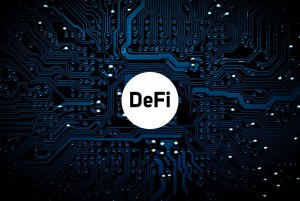Could This Startup Bridge between regulators and the DeFi space?
Even those wary of the development of cryptocurrencies will most probably recognize how fascinating the underlying blockchain technology is. One use of this technology, decentralized finance or DeFi, is at the cusp of significant expansion. Regulators are conscious of this rise and are acting accordingly.

DeFi is sometimes compared with the “wild west” by regulators looking at buggy smart contracts and flash loans. Nevertheless, the steady rise of DeFi has continued, and nothing seems to discourage VC funds from investing in several projects in the space.
Bitcoin is the most important effort to bypass established financial institutions, but the DeFi sector expands into insurance, lending, commodities trading, and even savings accounts far beyond cryptocurrencies. While cryptocurrencies were created as an alternative to fiat currencies, DeFi is based on the philosophy of replacing legacy systems.
As web3 and other parts of decentralization gains prominence, many have bought into the DeFi hype and what it offers the average crypto enthusiasts. The change in consumer behavior, which is often linked to the pandemic, has caused the price performance of assets like Bitcoin and Ethereum to be phenomenal in recent years. They are not just speculative, but Bitcoin displaces gold as a safe haven asset.
DeFi developers write the software and then leave the project to enable it to operate without a central entity. They contend that such a decentralization negates the necessity for SEC scrutiny, saying that certain cryptocurrencies, like bitcoin and ether, are decentralized enough to prevent regulation.
DeFi’s Expanding Services
DeFi can be described as alternative financial products and services based on blockchain. DeFi platforms allow users to engage in typical financial activities, such as lending and loaning, through direct peer-to-peer exchanges by directly mediating value transfer and eliminating the role of traditional financial middlemen. Transactions are made on a public blockchain, not by a bank or other central entity. DeFi services have a non-custodial design that means that theoretically the assets issued or managed on DeFi platforms cannot be unilaterally relocated or expropriated from parties other than the owners of the account.
DeFi leverages open protocols and decentralized applications or DApps to carry out transactions. Smart contracts, programs that work automatically when certain criteria are fulfilled are built on existing blockchains like Ethereum and Solana, and supply these protocols and DApps. Intelligent contracts replace the central financial institutions’ intermediate role in a blockchain using self-executing lines of code.
In the last year, total value locked as collateral in DeFi applications grew from under $2 billion to over $80 billion, according to data collected by DeFi Pulse.
Urgent Need Of Regulation
Advocates of cryptocurrency opposed early attempts to regulate the software’s underlying codes by saying that projects of open source are protected speech. But DeFi poses a lot of risk to the average user that makes it important that decentralization shouldn’t deter the need to regulate.
Firstly, many DeFi protocols, including nine of the biggest DeFi projects, are built on Ethereum. DeFi’s increased customer base has led to an appropriate rise in attack, bug, and network congestion. Ethereum’s public blockchain architecture is far from infallible. This might lead to high transaction costs for the network, unsuccessful transactions, and settlement problems. The high congestion in the network has in some circumstances brought DeFi applications to a standstill. For example, network congestion created a serious breakdown in the DeFi application in March 2020, leading to a total auction off over $8.32 million of cryptocurrency.
Secondly, the crypto market volatility is known. For example, in 2018, Bitcoin dropped more than 80 percent before it rebounded, approaching its worst recorded bear market. And unforeseen external variables such as social media might influence the market. For example, after Elon Musk posted a meme that many interpreted as Tesla could decrease its Bitcoin holdings, Bitcoin plunged significantly.
While panic buying produces big increases and leads to higher value above the genuine worth, panic selling of DeFi tokens may also lead to crashes which with fiat currencies would be unlikely. In June 2021, for example, tokens with a Crypto Village Accelerator and Galaxium Accelerator lost more than 60% over 24 hours. In the same 24- hour period, well-known tokens like Uniswap lost 7%.
Another issue is that DeFi is in her early years. The majority of the space services are programs that automate financial transactions and replace the bank’s traditional position as a broker. This leads to a number of dangers and an uncertain regulatory environment. The lack of intermediaries, the anonymity of pair-to-peer transactions, and DeFi’s worldwide reach pose a possibly increased risk for participants to comply. If regulatory organizations do not provide clear direct direction, DeFi platforms risk ambiguous conformity and legal responsibilities. They can involve a number of aspects, from anti-money laundering to consumer protection.
Investors, professionals, and regulators alike have urged for more regulatory clarity in the DeFi ecosystem in order to address these challenges. The Astra protocol, legal compliance and consumer protection layer, is a new program that is built as a regulator in the DeFi space. The protocol acts as an on-chain layer of assurance and safety for the ordinary DeFi user.
Astra Protocol: Regulation, Protection, Compliance
Smart contracts automating a decentralized decision-making system are a common component of all blockchain decentralized projects. It is a fundamental part of any decentralized system, including DeFi, as it creates confidence in the project as a secure investment. However, a regulator or regulatory protocol should be developed to help eliminate any ambiguity, prevent fraud and resolve disputes, ensuring that the public blockchains are safe for all users.
The Astra Protocol gives decentralized organizations a unique means to comply with global rules and regulatory norms while they remain decentralized. At a critical period in which there is so much suspicion, Astra seeks to provide the necessary confidence in the crypto and blockchain ecosystems.
Astra aims to create a legal layer that can be connected to any existing DeFi platform. Funds will always reach the right destination safely via Astra. If there is a malfunction, the team can resolve the issue and return the funds frictionlessly. Any problems can be solved amicably with the addition of a conflict clause – known as proof of trust – to the platform and smart contract.
This innovation is based on a Proof of Trust system, a built-in protection system that provides peace of mind in commercial transactions and contracts through an extra-judicial and extra-jurisdictional dispute resolution mechanism. The PoT mechanism helps to ensure that accidental or fraudulent transactions are addressed quickly, protecting stakeholders.
Matters such as the smart contract agreement in lending transactions or borrowing are therefore easily resolved because, at any time when one party is dissatisfied, this consensus mechanism can be invoked. There is a dispute resolution process included in all loan deals.
Conclusion
The current regulatory framework based on this traditional model will undoubtedly find ways to fit only awkwardly with a new scheme based on the absence of intermediaries. New forms of money and financial services will always cause some confusion at first. Astra will act as a cushion for regulation, compliance, and protection of DeFi users without sacrificing the benefits of decentralization.









